Year: 1990
Runtime: 119 Minutes
Director: Garry Marshall
Writer: J.F. Lawton
Stars: Richard Gere, Julia Roberts, Jason Alexander, Laura San Giacomo
By Bianca Garner
“You should totally watch Pretty Woman!” My aunt exclaimed during a recent conversation about must-see romantic films. Confession time: romantic comedies aren’t usually my cup of tea. I often find them predictable and riddled with clichés. I explained my reservations to my aunt, but she insisted “Pretty Woman” was different and worth a chance. With Valentine’s Day approaching, it seemed like the perfect opportunity to finally watch this iconic film. Initially, I thought I might end up writing a scathing review, detailing all the reasons I disliked it. However, as the movie unfolded, I found myself captivated by its charm, much like Edward Lewis (Richard Gere), the wealthy businessman, is enchanted by Vivian Ward (Julia Roberts), the vivacious and endearing sex worker. I was quickly won over by Roberts’ witty lines and spirited comebacks, captivated by Gere’s character’s admiring glances at Vivian, and wholeheartedly cheering for Vivian as she confidently stood up to the snobbish salespeople on Rodeo Drive. By the film’s end, I was unexpectedly moved, a testament to its enduring appeal.
Objectively, “Pretty Woman” should be everything I typically dislike in a Hollywood blockbuster. And while I found myself enjoying aspects of it, I still grapple with certain problematic elements, particularly its portrayal of sex work and the undeniable presence of the male gaze. Therefore, I decided to approach this review unconventionally, dissecting the film into ‘Good,’ ‘Bad,’ and ‘Ugly’ components. So, without further ado, let’s delve into my unconventional review of “Pretty Woman,” and explore where you can watch Pretty Woman today.
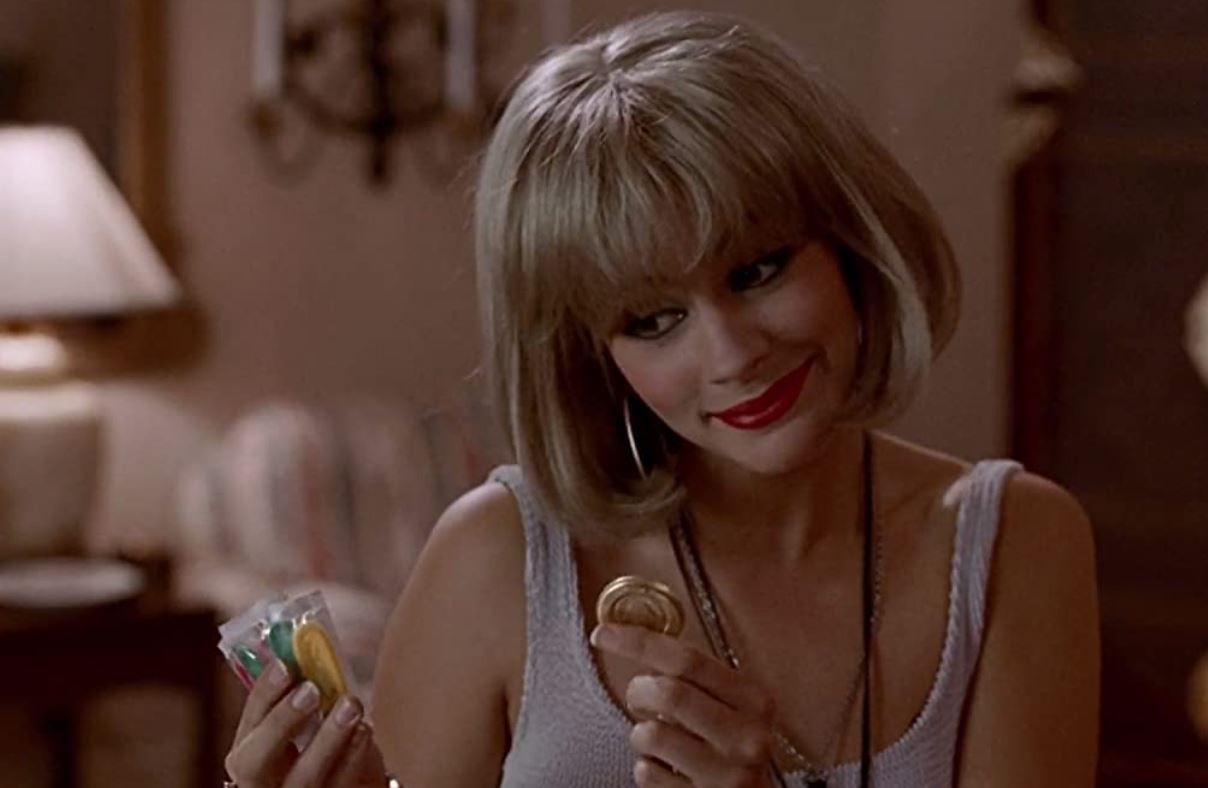 Julia Roberts in Pretty Woman (1990) | Photo credit: Hulton Archive/Getty Images – © 2012 Getty Images
Julia Roberts in Pretty Woman (1990) | Photo credit: Hulton Archive/Getty Images – © 2012 Getty Images
The Good
Firstly, Julia Roberts’ portrayal of Vivian is undeniably the heart of the film. Roberts is utterly charming and captivating, perfectly capturing Vivian’s vulnerability beneath her street-smart exterior. In less capable hands, Vivian could have easily become a caricature, but Roberts imbues her with authenticity, even within the somewhat fantastical world of “Pretty Woman.” The narrative and dialogue may stretch believability, but Roberts’ performance grounds the character in genuine emotion.
” As I started to watch it I slowly fell under its charm, much like how Edward Lewis (Richard Gere’s character) falls under the spell of the loveable Vivian Ward (Julia Roberts). “
Vivian is depicted as fiercely independent, choosing to work without a pimp and possessing a sharp wit honed by her life experiences. As highlighted in a CNN article “‘Pretty Woman’ at 25”, Vivian is “no pushover’..She dictates the way she wishes to be treated; when he offers her the status of a mistress, she dictates the status of a full equal,” as Brigit McCone notes in her Bitch Flicks piece, “Why ‘Pretty Woman’ Should Be Considered a Feminist Classic.” McCone further argues, “Let us never forget that when the prince rescues her, she rescues him right back.”
I concur with this perspective. Vivian never comes across as naive or overwhelmed. While her choices may have led her to sex work, she demonstrates an awareness of her circumstances and strives to take ownership of her life. Matthew Jacobs, writing for The Huffpost, aptly describes her as, ““Pretty Woman” never paints Vivian as a hapless tramp with no chance of prosperity. She’s Cinderella for the dawning millennium.”
Julia Roberts isn’t the only actor who elevates the film. Despite Richard Gere’s later criticisms of “Pretty Woman,” he successfully makes Edward less of a stereotypical cold-hearted businessman than initially written. Gere’s inherent charm shines through, and the undeniable chemistry between him and Roberts is palpable. As the CNN article points out, “Gere and Roberts, despite their 18-year age difference, have genuine chemistry. The interplay between her goofy exuberance and his bemused stoicism is mostly effective.” The film’s success largely hinges on the captivating dynamic between these two leads, keeping the audience invested in their evolving relationship.
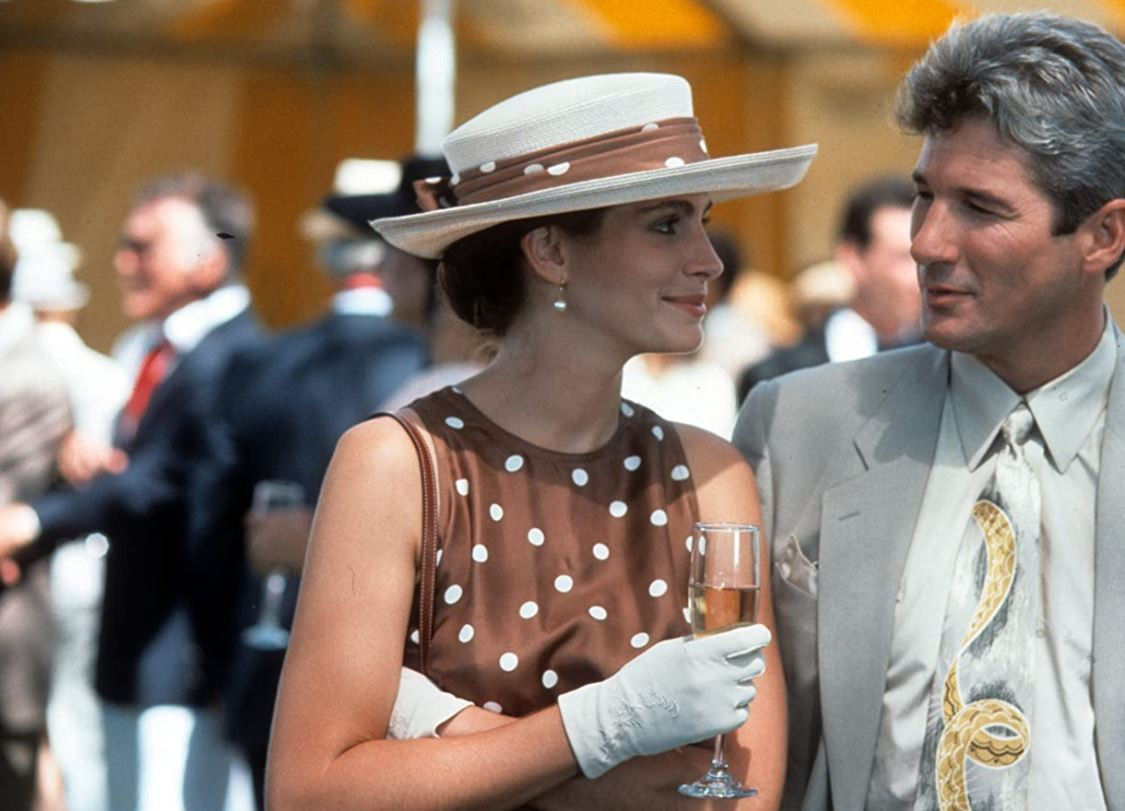 Richard Gere and Julia Roberts in Pretty Woman (1990) – Sharing a lighthearted moment in a scene that showcases their on-screen chemistry.
Richard Gere and Julia Roberts in Pretty Woman (1990) – Sharing a lighthearted moment in a scene that showcases their on-screen chemistry.
Finally, the film’s subtle exploration of consent is another commendable aspect. A particularly impactful scene is when Vivian confronts Edward about revealing her profession to his friend Stuckey (Jason Alexander) at the polo match, accusing him of attempting to “pass her around to his friends.” Vivian powerfully declares, “You think you can just pass me around to your friends, I’m not your toy. You don’t own me, I decide! I say who, I say when, I say who!” Feminist writer Roxane Gay observes, “Consent is a real part of this movie. I think the way she acts is pretty feminist, especially for the time… For a woman to be sexy and to be self-actualised in the ways that Vivian is self-actualised is not something we saw a lot of in movies [at the time].”
“The film mostly works because of the capability of these two actors and we stay invested in the story because of their interactions with one another. “
The Bad
Despite its positive attributes, “Pretty Woman” also presents several problematic aspects. Fundamentally, the film operates as a contemporary fairy tale, perpetuating the notion that Vivian’s only path to a better life is through “rescue” by Edward.
Katie Hail-Jares, a board member of the Sex Workers Outreach Project (SWOP USA), has critically analyzed the troubling messages within “Pretty Woman.” As mentioned in the CNN piece, “Vivian’s exit from sex work thanks to Gere’s character is also troubling, [as Hail-Jares states]”In the movie she’s able to fill economic void with Edward’s money but in reality that doesn’t happen.”
While the film occasionally winks at its fairy tale nature, even explicitly referencing “Cinderella” and “Rapunzel” through dialogue between Vivian and her friend Kit (Laura San Giacomo), it never truly interrogates the potentially harmful impact of these narratives. In one scene, Vivian asks Kit if she knows any sex workers who have “settled down.” When Vivian presses for a name, Kit retorts, “What, you want me to name someone? You want like a name? Oh, God, the pressure of a name… I got it. Cindafuckin’rella.”
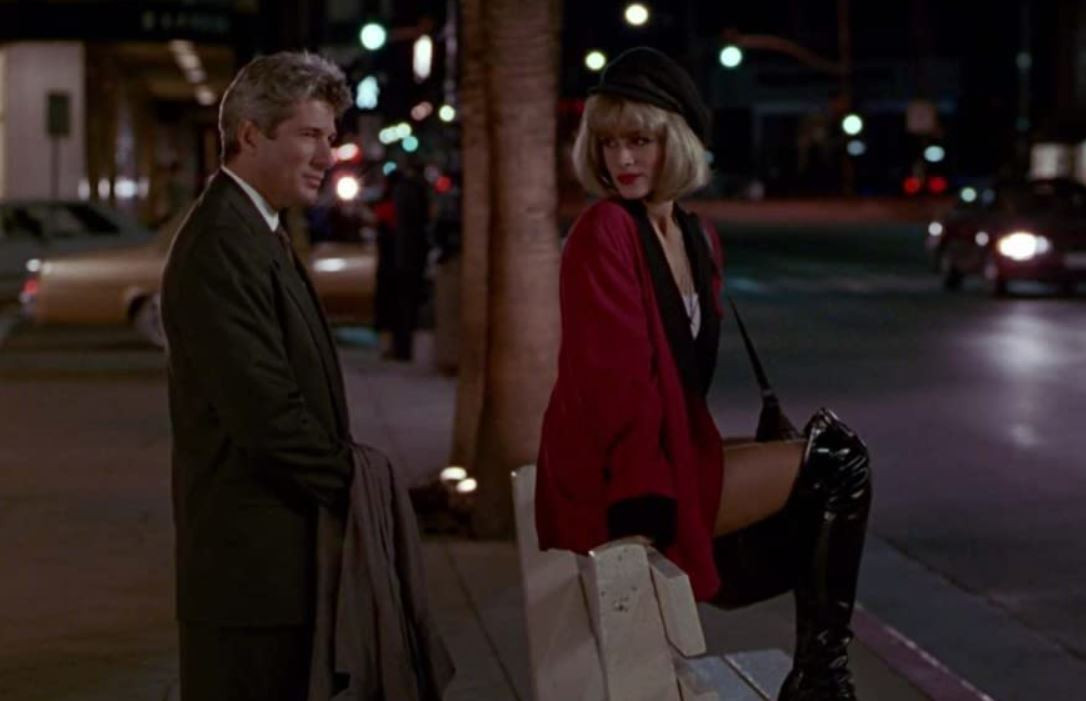 Richard Gere and Julia Roberts in Pretty Woman (1990) – Edward and Vivian share a tender moment, highlighting the fairytale romance central to the film.
Richard Gere and Julia Roberts in Pretty Woman (1990) – Edward and Vivian share a tender moment, highlighting the fairytale romance central to the film.
“The film never attempts to discuss how fairy tales can have a negative impact on our self-esteem, especially for young girls. “
Vivian even reveals to Edward her difficult childhood, including an abusive mother and fantasies of being rescued from her attic “tower” by a prince. Yet, the film stops short of examining how these fairy tale tropes can negatively influence self-perception, particularly for young women.
Fairy tale princesses are often defined solely by their beauty, reinforcing superficial values. Vanessa Loder, writing for the Huffpost, argues, “If women are valued for looking pretty and for finding a prince rather than for hard work, resilience, courage and powerful vulnerability, what is that telling our children — sons and daughters — about how women “should” behave and what they “should” focus on?”. “Pretty Woman” heavily emphasizes Vivian’s beauty and sex appeal. Edward frequently comments on her attractiveness, even uttering the line, “Do you have anything in this shop as beautiful as she is?” during their shopping spree.
The film also promotes a simplistic “money solves everything” mentality and glorifies consumerism, mirroring the “greed is good” ethos of the 80s and 90s. (It’s important to note that “Pretty Woman” is not unique in this regard). The CNN piece quotes Bitch Flicks’ Johnson, who states, “Ideologically, ‘Pretty Woman’ is a love song to consumerism and capitalism,” . Johnson continues, “‘Pretty Woman’ depicts a world where everyone is either a card-carrying member of the corporate caste or an obliging subordinate … It is obsessed with things (hotel suites, private jets, fancy clothes) and encourages the audience to share its obsession with things.” While shopping sprees can be entertaining on screen, “Pretty Woman” suggests that Vivian’s worth is only truly recognized once she adopts designer labels and a high-end lifestyle.
Furthermore, the film undeniably embodies the “male gaze.” Vivian’s introduction immediately exemplifies this, with the camera first focusing on her backside as she lies in bed, her back to the viewer. From the outset, her character is sexualized, and throughout the film, she is often demeaned by male characters. The scene where Stuckey assaults her towards the film’s climax tragically illustrates the real-world vulnerability of sex workers to male violence.
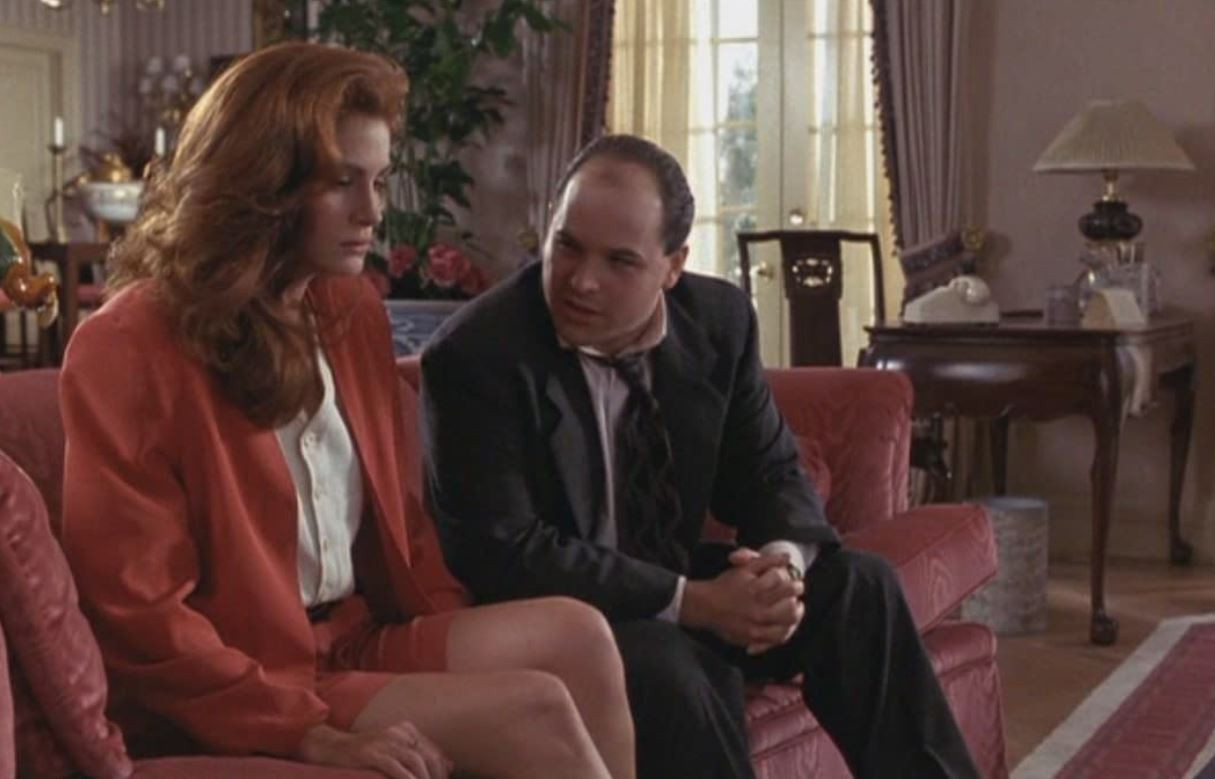 Julia Roberts and Jason Alexander in Pretty Woman (1990) – A tense scene highlighting the darker undertones of the film, contrasting with its romantic comedy facade.
Julia Roberts and Jason Alexander in Pretty Woman (1990) – A tense scene highlighting the darker undertones of the film, contrasting with its romantic comedy facade.
The Ugly
Disturbingly, one of “Pretty Woman’s” taglines was “Who knew it was so much fun to be a hooker?” The reality of sex work is often harsh and deeply troubling, certainly not something to be trivialized. As highlighted in a Huffpost article (‘17 Facts About Sexual Violence and Sex Work’), “Sex workers experience high levels of sexual violence. Globally, sex workers have a 45 to 75% chance of experiencing sexual violence at some point in their careers and a 32 to 55% chance of experiencing sexual violence in a given year.”
While Vivian and Kit briefly touch upon the hardships of sex work, their portrayal remains relatively sanitized. They face rent struggles, but maintain housing, appear healthy, and seemingly avoid severe drug addiction. They even denigrate other sex workers as “crack whores,” creating a hierarchy that positions them as somehow superior and more deserving of “rescue.” Vivian is presented as exceptional, capable of seamlessly transitioning into high society, making her worthy of Edward’s affections and a fairytale ending.
“I was shocked to discover that one of the film’s taglines was “Who knew it was so much fun to be a hooker?”. The reality of being a sex worker is grim and very disturbing one and shouldn’t be treated as something so ‘light-hearted’. “
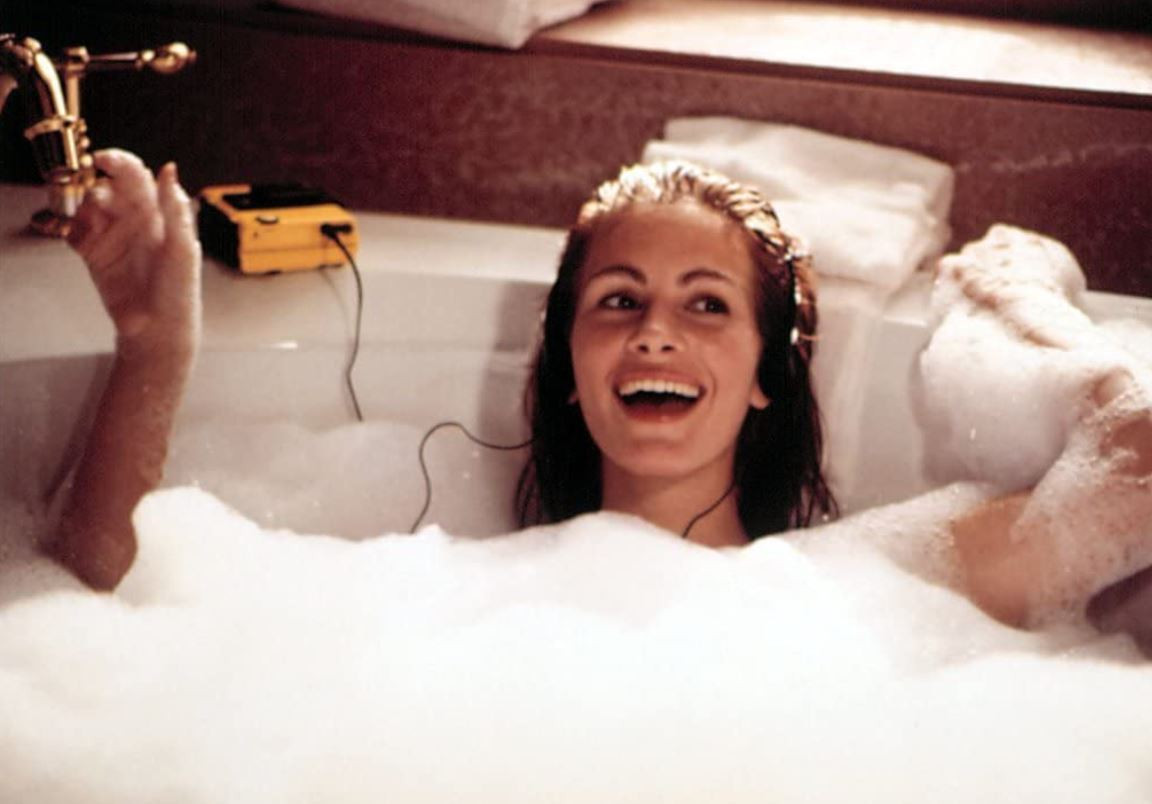 Julia Roberts in Pretty Woman (1990) – Vivian's transformation scene, symbolizing her entry into a new world, but also raising questions about superficial change.
Julia Roberts in Pretty Woman (1990) – Vivian's transformation scene, symbolizing her entry into a new world, but also raising questions about superficial change.
As Hail-Jarnes points out in the CNN piece, “”What’s problematic is how it portrays sex work at large, like she’s the only one worth saving. You get the sense that she’s not the norm, and that allows us to get invested in her while not necessarily worrying about the welfare of other women who fall into the (sex worker) stereotype.””
Conclusion: Is Pretty Woman Worth Watching? And Where Can You Find It?
So, do I ultimately recommend “Pretty Woman”? It’s complicated. For viewers seeking a genuinely feminist narrative, this film falls short. I wouldn’t recommend it to young viewers, particularly those under sixteen, due to its potentially problematic portrayal of women and societal roles. “Pretty Woman” is undeniably a product of its time, offering a glimpse into the cultural landscape of 1990 and highlighting how societal perspectives have evolved since then.
Overall, “Pretty Woman” provides a dose of escapist, consumerist entertainment that can be enjoyable in the moment but leaves a somewhat unsettling aftertaste upon reflection. It’s a film best viewed with a critical eye, acknowledging its charm while recognizing its inherent flaws.
If you’re curious to experience “Pretty Woman” for yourself, here’s where you can watch it:
- Streaming: “Pretty Woman” is currently available for streaming on services such as [Insert current streaming services like Hulu, HBO Max, etc. – research current availability] in the US. Availability may vary by region, so check your local streaming providers.
- Rent or Buy: You can also rent or purchase “Pretty Woman” digitally on platforms like Amazon Prime Video, YouTube, Google Play, Apple TV, and Vudu.
- Physical Media: For those who prefer physical copies, “Pretty Woman” is available on Blu-ray and DVD.
Whether you choose to revisit this 90s classic or experience it for the first time, understanding its complexities and contradictions will enrich your viewing experience. It’s a film that sparks conversation, and its enduring popularity ensures it remains a relevant cultural touchstone.
Share this:
- Threads
- Bluesky
Like Loading…

